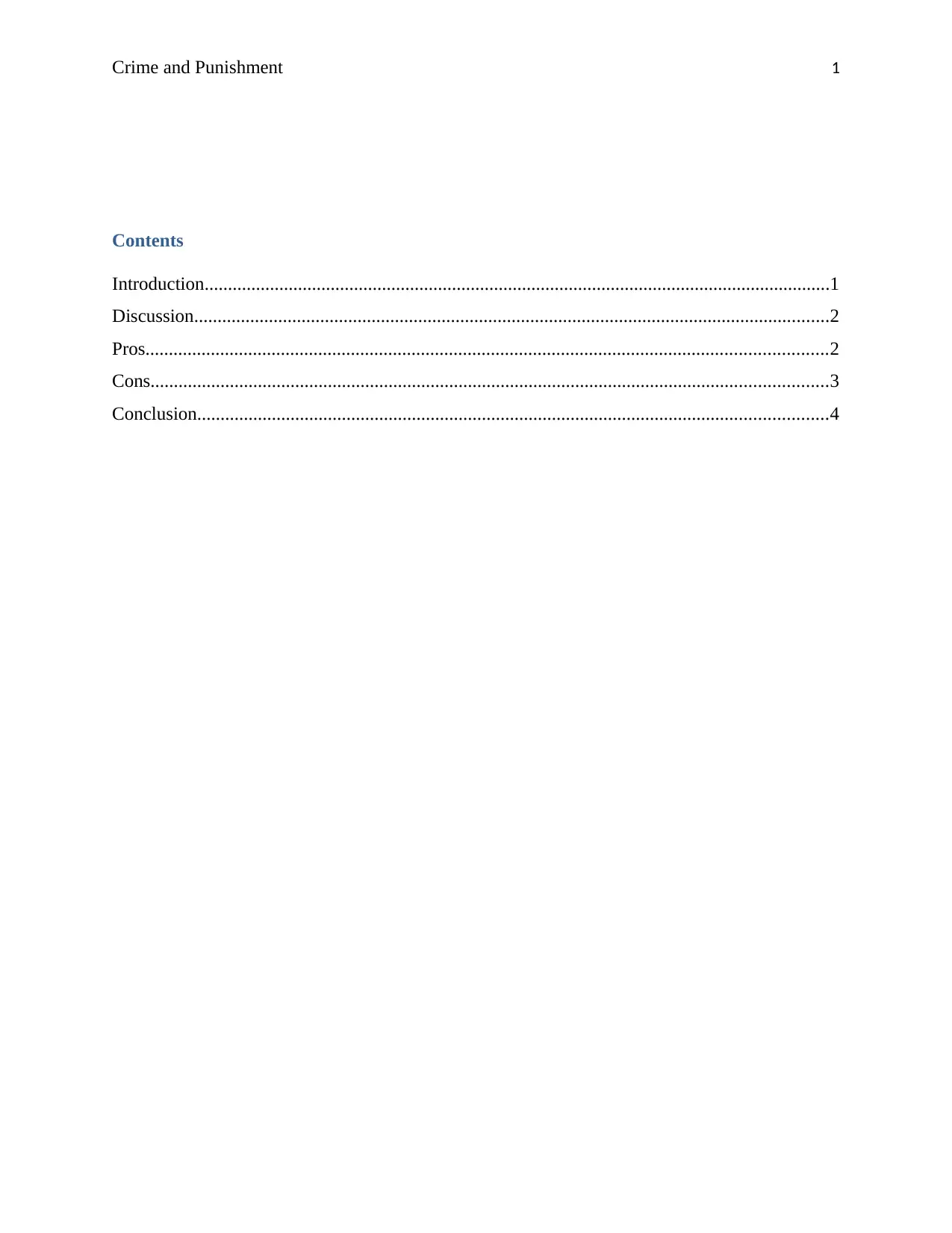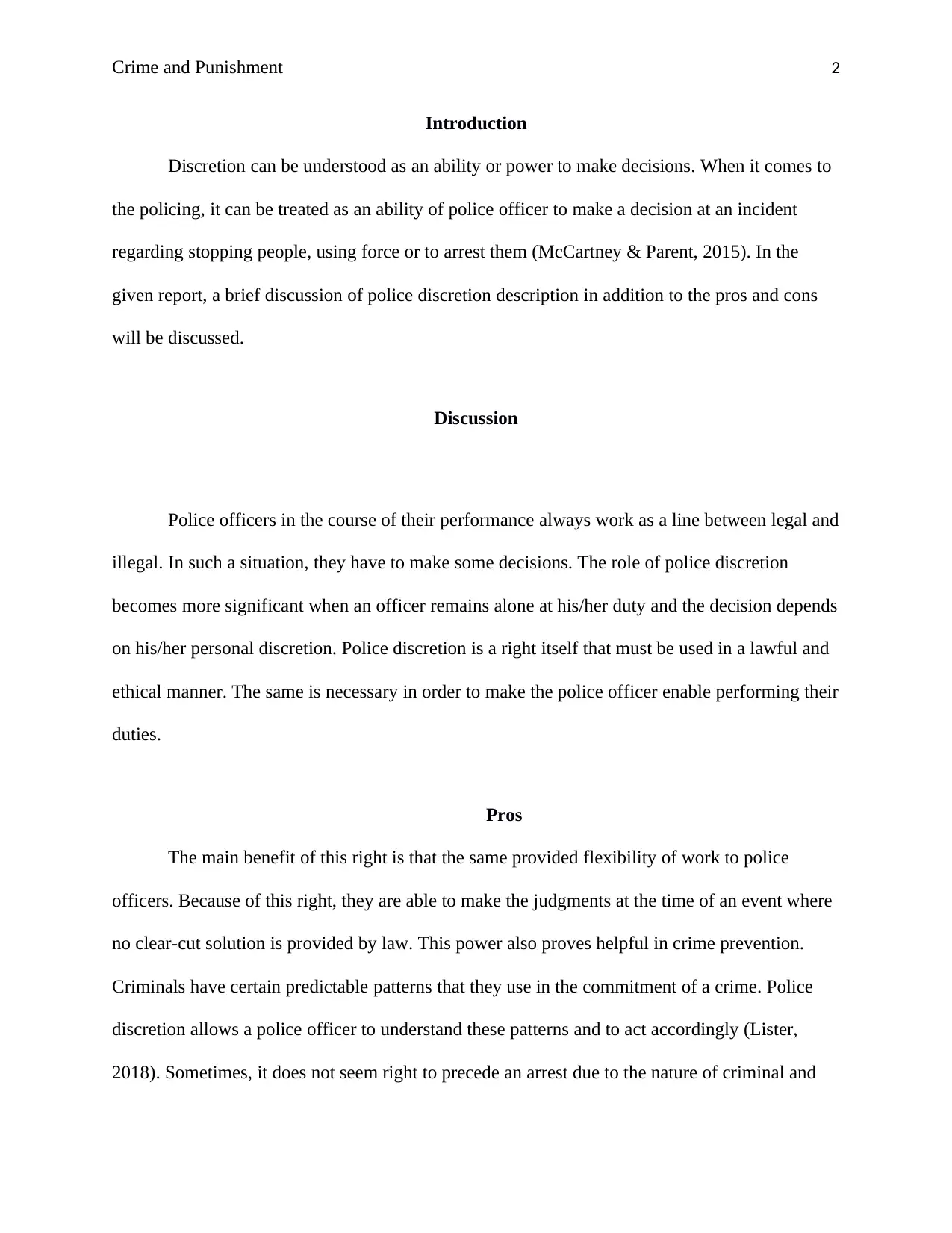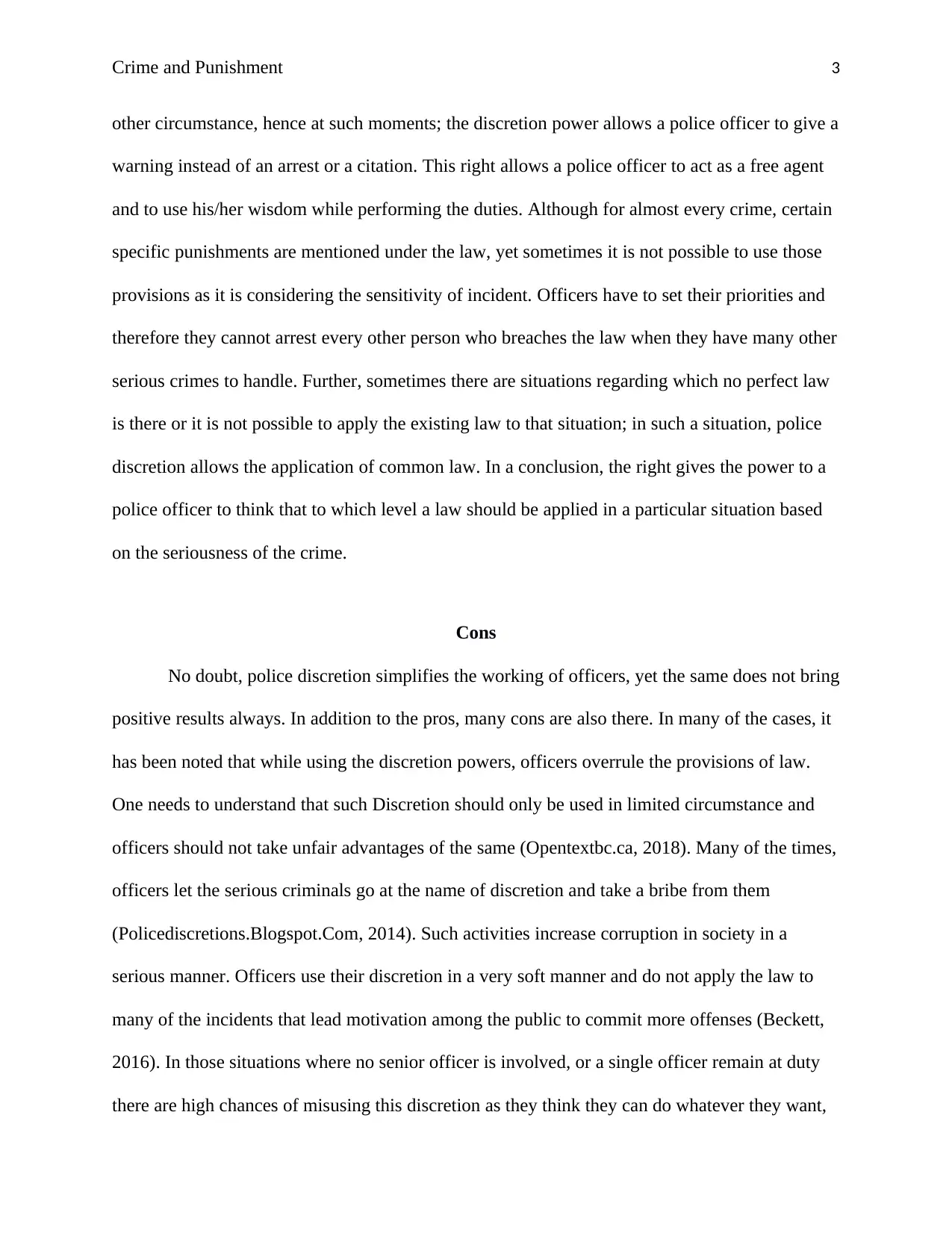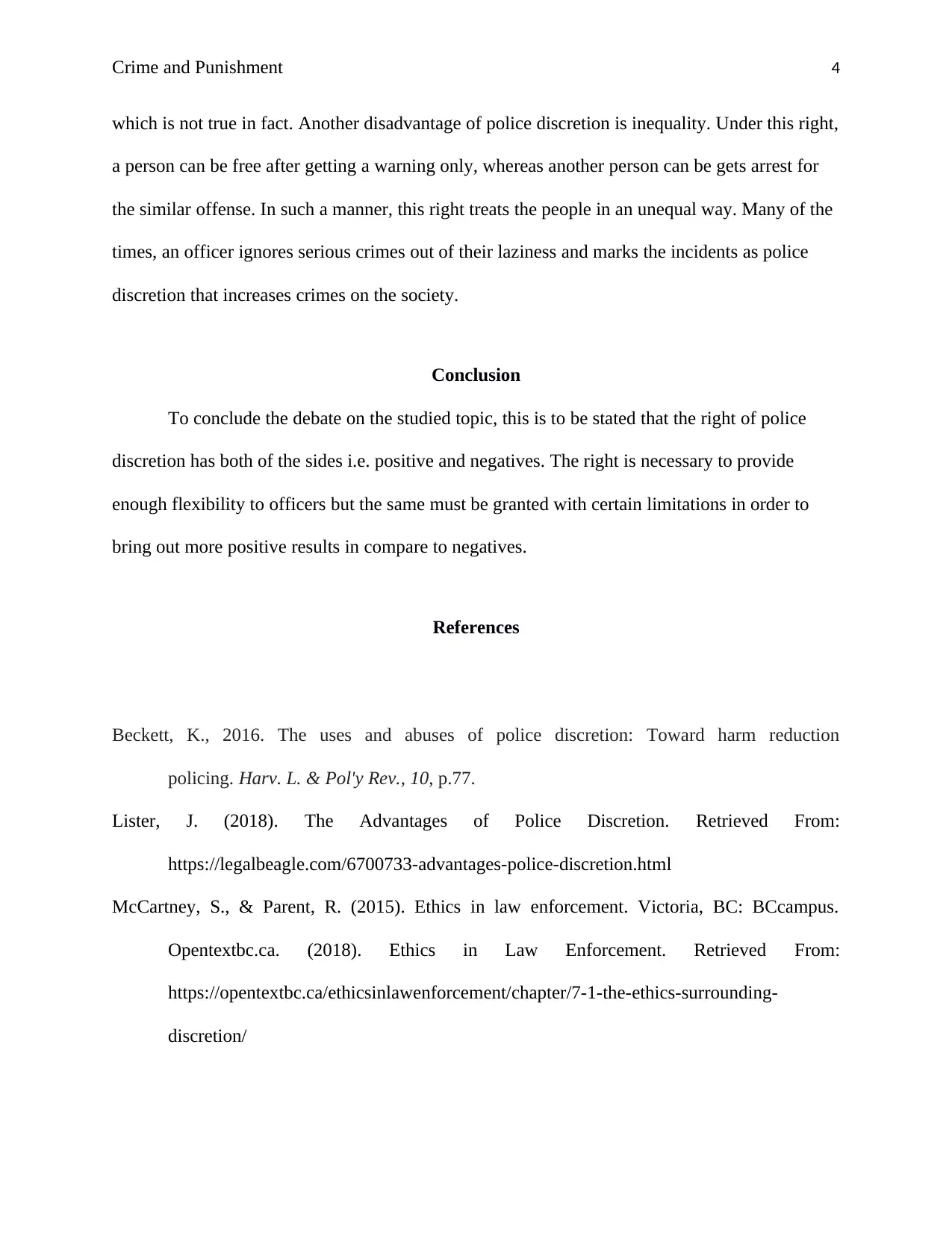Exploring Police Discretion: Crime, Punishment, and Ethical Concerns
VerifiedAdded on 2023/05/30
|6
|975
|370
Essay
AI Summary
This essay provides a comprehensive overview of police discretion, exploring its role in law enforcement and its impact on crime and punishment. It delves into the advantages of police discretion, such as providing flexibility to officers in making judgments during incidents where clear-cut legal solutions are lacking, aiding in crime prevention by understanding criminal patterns, and allowing officers to issue warnings instead of arrests in certain circumstances. However, the essay also addresses the disadvantages, including the potential for officers to overrule legal provisions, engage in corruption, and apply the law unequally, leading to increased crime and public dissatisfaction. The essay concludes that while police discretion is necessary for effective law enforcement, it must be implemented with limitations to maximize positive outcomes and minimize negative consequences. Desklib offers more resources for students.

Running Head: Crime and Punishment 0
Crime and Punishment
Student’s Name
11/25/2018
Crime and Punishment
Student’s Name
11/25/2018
Paraphrase This Document
Need a fresh take? Get an instant paraphrase of this document with our AI Paraphraser

Crime and Punishment 1
Contents
Introduction......................................................................................................................................1
Discussion........................................................................................................................................2
Pros..................................................................................................................................................2
Cons.................................................................................................................................................3
Conclusion.......................................................................................................................................4
Contents
Introduction......................................................................................................................................1
Discussion........................................................................................................................................2
Pros..................................................................................................................................................2
Cons.................................................................................................................................................3
Conclusion.......................................................................................................................................4

Crime and Punishment 2
Introduction
Discretion can be understood as an ability or power to make decisions. When it comes to
the policing, it can be treated as an ability of police officer to make a decision at an incident
regarding stopping people, using force or to arrest them (McCartney & Parent, 2015). In the
given report, a brief discussion of police discretion description in addition to the pros and cons
will be discussed.
Discussion
Police officers in the course of their performance always work as a line between legal and
illegal. In such a situation, they have to make some decisions. The role of police discretion
becomes more significant when an officer remains alone at his/her duty and the decision depends
on his/her personal discretion. Police discretion is a right itself that must be used in a lawful and
ethical manner. The same is necessary in order to make the police officer enable performing their
duties.
Pros
The main benefit of this right is that the same provided flexibility of work to police
officers. Because of this right, they are able to make the judgments at the time of an event where
no clear-cut solution is provided by law. This power also proves helpful in crime prevention.
Criminals have certain predictable patterns that they use in the commitment of a crime. Police
discretion allows a police officer to understand these patterns and to act accordingly (Lister,
2018). Sometimes, it does not seem right to precede an arrest due to the nature of criminal and
Introduction
Discretion can be understood as an ability or power to make decisions. When it comes to
the policing, it can be treated as an ability of police officer to make a decision at an incident
regarding stopping people, using force or to arrest them (McCartney & Parent, 2015). In the
given report, a brief discussion of police discretion description in addition to the pros and cons
will be discussed.
Discussion
Police officers in the course of their performance always work as a line between legal and
illegal. In such a situation, they have to make some decisions. The role of police discretion
becomes more significant when an officer remains alone at his/her duty and the decision depends
on his/her personal discretion. Police discretion is a right itself that must be used in a lawful and
ethical manner. The same is necessary in order to make the police officer enable performing their
duties.
Pros
The main benefit of this right is that the same provided flexibility of work to police
officers. Because of this right, they are able to make the judgments at the time of an event where
no clear-cut solution is provided by law. This power also proves helpful in crime prevention.
Criminals have certain predictable patterns that they use in the commitment of a crime. Police
discretion allows a police officer to understand these patterns and to act accordingly (Lister,
2018). Sometimes, it does not seem right to precede an arrest due to the nature of criminal and
⊘ This is a preview!⊘
Do you want full access?
Subscribe today to unlock all pages.

Trusted by 1+ million students worldwide

Crime and Punishment 3
other circumstance, hence at such moments; the discretion power allows a police officer to give a
warning instead of an arrest or a citation. This right allows a police officer to act as a free agent
and to use his/her wisdom while performing the duties. Although for almost every crime, certain
specific punishments are mentioned under the law, yet sometimes it is not possible to use those
provisions as it is considering the sensitivity of incident. Officers have to set their priorities and
therefore they cannot arrest every other person who breaches the law when they have many other
serious crimes to handle. Further, sometimes there are situations regarding which no perfect law
is there or it is not possible to apply the existing law to that situation; in such a situation, police
discretion allows the application of common law. In a conclusion, the right gives the power to a
police officer to think that to which level a law should be applied in a particular situation based
on the seriousness of the crime.
Cons
No doubt, police discretion simplifies the working of officers, yet the same does not bring
positive results always. In addition to the pros, many cons are also there. In many of the cases, it
has been noted that while using the discretion powers, officers overrule the provisions of law.
One needs to understand that such Discretion should only be used in limited circumstance and
officers should not take unfair advantages of the same (Opentextbc.ca, 2018). Many of the times,
officers let the serious criminals go at the name of discretion and take a bribe from them
(Policediscretions.Blogspot.Com, 2014). Such activities increase corruption in society in a
serious manner. Officers use their discretion in a very soft manner and do not apply the law to
many of the incidents that lead motivation among the public to commit more offenses (Beckett,
2016). In those situations where no senior officer is involved, or a single officer remain at duty
there are high chances of misusing this discretion as they think they can do whatever they want,
other circumstance, hence at such moments; the discretion power allows a police officer to give a
warning instead of an arrest or a citation. This right allows a police officer to act as a free agent
and to use his/her wisdom while performing the duties. Although for almost every crime, certain
specific punishments are mentioned under the law, yet sometimes it is not possible to use those
provisions as it is considering the sensitivity of incident. Officers have to set their priorities and
therefore they cannot arrest every other person who breaches the law when they have many other
serious crimes to handle. Further, sometimes there are situations regarding which no perfect law
is there or it is not possible to apply the existing law to that situation; in such a situation, police
discretion allows the application of common law. In a conclusion, the right gives the power to a
police officer to think that to which level a law should be applied in a particular situation based
on the seriousness of the crime.
Cons
No doubt, police discretion simplifies the working of officers, yet the same does not bring
positive results always. In addition to the pros, many cons are also there. In many of the cases, it
has been noted that while using the discretion powers, officers overrule the provisions of law.
One needs to understand that such Discretion should only be used in limited circumstance and
officers should not take unfair advantages of the same (Opentextbc.ca, 2018). Many of the times,
officers let the serious criminals go at the name of discretion and take a bribe from them
(Policediscretions.Blogspot.Com, 2014). Such activities increase corruption in society in a
serious manner. Officers use their discretion in a very soft manner and do not apply the law to
many of the incidents that lead motivation among the public to commit more offenses (Beckett,
2016). In those situations where no senior officer is involved, or a single officer remain at duty
there are high chances of misusing this discretion as they think they can do whatever they want,
Paraphrase This Document
Need a fresh take? Get an instant paraphrase of this document with our AI Paraphraser

Crime and Punishment 4
which is not true in fact. Another disadvantage of police discretion is inequality. Under this right,
a person can be free after getting a warning only, whereas another person can be gets arrest for
the similar offense. In such a manner, this right treats the people in an unequal way. Many of the
times, an officer ignores serious crimes out of their laziness and marks the incidents as police
discretion that increases crimes on the society.
Conclusion
To conclude the debate on the studied topic, this is to be stated that the right of police
discretion has both of the sides i.e. positive and negatives. The right is necessary to provide
enough flexibility to officers but the same must be granted with certain limitations in order to
bring out more positive results in compare to negatives.
References
Beckett, K., 2016. The uses and abuses of police discretion: Toward harm reduction
policing. Harv. L. & Pol'y Rev., 10, p.77.
Lister, J. (2018). The Advantages of Police Discretion. Retrieved From:
https://legalbeagle.com/6700733-advantages-police-discretion.html
McCartney, S., & Parent, R. (2015). Ethics in law enforcement. Victoria, BC: BCcampus.
Opentextbc.ca. (2018). Ethics in Law Enforcement. Retrieved From:
https://opentextbc.ca/ethicsinlawenforcement/chapter/7-1-the-ethics-surrounding-
discretion/
which is not true in fact. Another disadvantage of police discretion is inequality. Under this right,
a person can be free after getting a warning only, whereas another person can be gets arrest for
the similar offense. In such a manner, this right treats the people in an unequal way. Many of the
times, an officer ignores serious crimes out of their laziness and marks the incidents as police
discretion that increases crimes on the society.
Conclusion
To conclude the debate on the studied topic, this is to be stated that the right of police
discretion has both of the sides i.e. positive and negatives. The right is necessary to provide
enough flexibility to officers but the same must be granted with certain limitations in order to
bring out more positive results in compare to negatives.
References
Beckett, K., 2016. The uses and abuses of police discretion: Toward harm reduction
policing. Harv. L. & Pol'y Rev., 10, p.77.
Lister, J. (2018). The Advantages of Police Discretion. Retrieved From:
https://legalbeagle.com/6700733-advantages-police-discretion.html
McCartney, S., & Parent, R. (2015). Ethics in law enforcement. Victoria, BC: BCcampus.
Opentextbc.ca. (2018). Ethics in Law Enforcement. Retrieved From:
https://opentextbc.ca/ethicsinlawenforcement/chapter/7-1-the-ethics-surrounding-
discretion/

Crime and Punishment 5
Policediscretions.Blogspot.Com. (2014). Pros and Cons of Police Discretion. Retrieved From:
http://policediscretions.blogspot.com/2014/08/police-discretion.html
Policediscretions.Blogspot.Com. (2014). Pros and Cons of Police Discretion. Retrieved From:
http://policediscretions.blogspot.com/2014/08/police-discretion.html
⊘ This is a preview!⊘
Do you want full access?
Subscribe today to unlock all pages.

Trusted by 1+ million students worldwide
1 out of 6
Related Documents
Your All-in-One AI-Powered Toolkit for Academic Success.
+13062052269
info@desklib.com
Available 24*7 on WhatsApp / Email
![[object Object]](/_next/static/media/star-bottom.7253800d.svg)
Unlock your academic potential
Copyright © 2020–2026 A2Z Services. All Rights Reserved. Developed and managed by ZUCOL.





